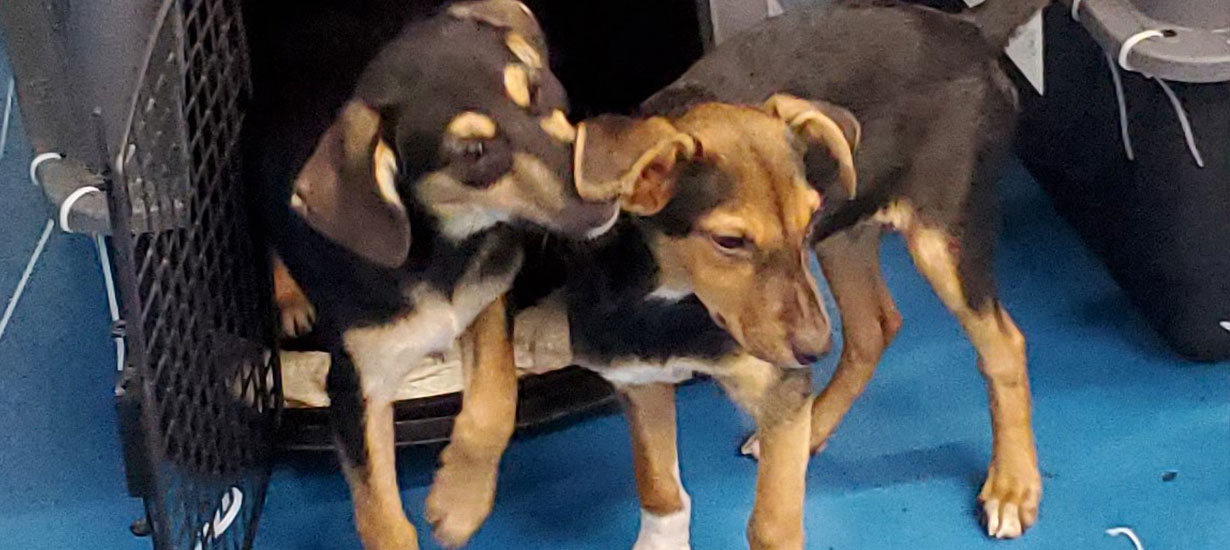IMPORTANT: Our shelter is temporarily closed to visitors. DETAILS HERE
Limited visitation for cats. See Details HERE

Have you ever wondered how we get dogs from far away locations?
Our priority is always to assist dogs in our own city, but as there aren’t large numbers of dogs surrendered by their owners, and even fewer are found as strays in Toronto, we’re able to open our doors to dogs from other parts of Canada and other countries.
When we have openings for dogs (and there are none needing our help in Toronto), we first work with rescues from other areas of Canada. You’ve likely heard about our Northern dogs, as we’ve had great success working with rescues who bring dogs from northern Ontario, Manitoba and Nunavut to the Greater Toronto Area so they can find homes. These dogs may be strays who are living on the streets or their owners may not be able to care for them any more. Since we have a demand for dogs in our area, we can quickly find them homes.
We next look to international rescues. These organizations are saving dogs who are left to fend for themselves on the streets, foraging for food with no medical care. Shelters are often overcrowded and there is not much hope for adoption. It’s a much different life than what can be offered here in Canada where dogs are valued as pets and members of the family.
The process for bringing these dogs into our care relies on the hard work of our dog team, who use their connections with international rescues to bring these dogs to EHS.
We’re lucky to have volunteers who have established contacts in the rescue community and experience with shelters in places such as the Dominican Republic and Mexico. And as the rescue community is surprisingly small, we’ve been able to get in touch with even more international rescues and over the last couple of years have taken in dogs from Portugal, Cayman Islands, Greece, Taiwan, India and more.
To bring these dogs into our care, we’ll work with the partner rescue to find a travel companion who’s flying to Toronto and can act as an escort for the dog. Without a travel companion, the dog would need to fly cargo alone, and this can be more costly.
To find a travel companion, the rescue will search for someone flying from their closest airport to Pearson. They’ll then take care of booking the dog on the companion’s flight — if it’s a small dog, this will be in the cabin, if it’s a larger dog it will be in the cargo — and they’ll cover the pet fee, which can vary depending on the location and the airline.
The rescue also ensures the dog is vaccinated, spayed or neutered and receives any required veterinary care prior to the flight. On the day of departure, the dogs are checked into the airline and all necessary paperwork is provided to the travel companion. Customs paperwork is completed on both sides — the country they’re coming from and then upon entry to Canada.
When the dog lands at Pearson, an EHS volunteer will meet it there with our required paperwork and will then meet the travel companion at Pearson airport to collect the dogs. The process can be long, but it’s worth it and the rescues are very appreciative to get the dogs out and send them on their journey to their forever homes. This also allows them to free up space to bring in more dogs that need care.
We know travel is restricted right now, but the next time you’re able to take a trip, consider becoming a pet escort for a dog. You can even do this if you’re travelling within Canada, such as to a northern community.
In the past we’ve regularly received dogs from the Dominican Republic, Mexico and the Bahamas as the flights are short and we have partners in these countries. These are also usually top travel destinations for Torontonians who can act as travel companions.
The recent travel restrictions which have banned flights from the Caribbean and Mexico mean we’re not currently able to take in any dogs from these locations. We hope to see this resume when flights begin again after April 30 as we know the shelters there are full or overflowing with dogs looking for homes.
In the meantime, we’re still able to receive owner surrenders and are continuing our work with our partners in Canada.